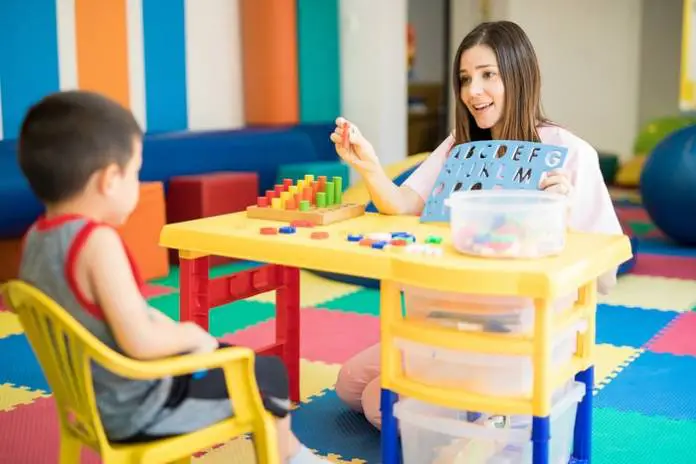
Teachers play a huge part in child development. They should be an encouraging and inspiring role model for the children they teach during and after they leave the classroom. This is especially true for teachers who are responsible for children with special needs.
Working as a special education teacher is not easy, but it is extremely rewarding when done and handled correctly. Your inspiration to work with children with special needs will play a huge part in how you handle the stresses of the job. For example, if you have a close family member with special needs and you have grown up learning how to communicate and understand how to care for them, you will be more prepared than someone who has been inspired by things they have seen or read online or on the TV.
Either way, there are some traits and requirements that all special education teachers need in order to succeed and thrive in their role. This is not a career that you should rush into. A lot of training, preparation and work experience is required before jumping into the role of a special education teacher. Every child is an individual, and every child you work with will most likely have a different learning disability, which will mean you will need to be able to adapt and understand the individual needs of your pupils.
Today, we will be taking a closer look at the traits and requirements needed to become a special education teacher, to help you see whether this career would be right for you.
Your Education
Before we look at the traits and requirements needed for this career, you must understand the educational requirements. First off, you will need to have a qualified teacher status in England and Wales or Scotland’s teaching qualification. This can be gained by completing at least one degree-level qualification, a School Direct or a Teach First teacher-training programme, or a postgraduate certificate of education.
Once you have gained this status, you will need to undergo more training and gain qualifications in order to understand the special needs elements of your future career. You do not need to attend a bricks and mortar university to gain these further qualifications, as there are plenty of online options. For example, Exeter Online offers a fantastic opportunity to study an MA in Education online, which means you can work alongside the qualification and you can complete it in your own time (as long as you meet the set deadlines). This programme will teach you how to look at the issues that surround special educational needs, how to explore certain concepts and ways to approach situations.
Be Adaptable
Adaptability is an essential skill for anyone looking to become a special education teacher. When you work with children, especially those with learning difficulties, every day will be different. You should never expect things to run the way you want them to, as you can’t predict what will happen in the classroom on that day. Your pupils may experience a breakdown or an outburst, which will cause disruptions and may trigger other children to act up.
A teacher must be able to maintain peace and order in the classroom. They should be able to adapt their original plans in order to stick to the set schedule and they should be flexible during each situation that they face. Being adaptable will set a good example to your students, as special needs children often need to learn how to adjust to their surroundings based on their disabilities.
Calm Nature
A classroom environment can be stressful for all children, whether they do or don’t have special needs. As you can imagine, the additional learning and behavioural issues children with special needs harbour will magnify this stress. A special education teacher will need to have a calm nature in order to make their students feel relaxed and to support them during intense and confusing situations. This will help to reduce the levels of stress that an individual feels, which will put the minds of the other children in the classroom at ease. The maintenance of a calm atmosphere is key to creating a classroom where the students feel safe and secure.
Even Tempered
An even temper needs to come alongside a calm nature. The behaviour many special needs children will express will be testing at times and may wear down your patience. It can easily get heated and stressful, but you will need to be able to control your frustration during these times and find a way to cope with the situations these children put you in. Special education teachers will work closely with the student’s parents/carers, therapists and other important professionals that are involved in their lives. This could make you feel more stressed and under pressure at times.
To be a good special education teacher, you must have an excellent and highly effective coping mechanism and be even tempered throughout these stresses.
Detail-Orientated
Attention to detail is a specific and vital aspect of being a well-organised and skilled special education teacher. When you work with children with their own individual special needs and requirements, you will have to be consistent when it comes to assessing your pupils. This can be carried out formally or informally, but whatever you decide to do, details are key to making a difference.
When you start to search and apply for jobs as a special education teacher, you will notice that ‘attention to detail’ is a listed requirement on the application. It will also help when it comes to meeting deadlines and helping children to reach their goals for the school year. Paying attention to detail will help you to stick to a clear schedule and keep children calm by creating a daily routine, which will help you meet their expectations.
Highly Intuitive
Many children with special needs will find it hard to express their feelings and emotions due to their communication skills being less developed than others. This could cause some children to behave in a problematic or a testing way or keep themselves to themselves because they experience regular confusion, frustration and other overwhelming emotion that they find difficult to control or deal with. If you want to become a special education teacher, then you will need to be highly intuitive. This will make it easier to sense any underlying issues that may be tricky to detect in a child’s behaviour, as well as being able to help those in need when the situation that triggers this behaviour occurs.
Very Creative
Creativity is a skill that every teacher should possess. The best teachers out there will be able to adapt each lesson in a creative way in order to highlight the learning strengths of each of their pupils and to keep them interested and engaged throughout your lessons. A special education teacher will need to make sure each child is involved in the chosen learning process, even if it means they have to teach the same thing in 4-5 different ways.
To prepare yourself, you should do your own research into new teaching techniques on a regular basis. This will benefit all of your students because it will allow you to work with each child’s individual strengths while teaching and developing their skills in other areas.
Well Organised
Being organised is one of the essential skills you need to become a special education teacher. This skill will help you every single day in the classroom. The children you teach will feel a lot more settled and confident around you if you provide them with a highly structured and organised atmosphere to learn in.
Using colour coordinated baskets and folders is one of the main ways special education teachers keep their classrooms neat and organised. Children love this method because they can relate their favourite topics to a colour. Using labels to highlight important areas in the classroom and assigning their pupils a notebook they can take home and use in school for communication are other highly effective methods of organisation.
Special education teachers will need to use their skills of organisation for things outside of the classroom, like keeping records to show administrators that they are keeping themselves up-to-date on essential teaching requirements.
Love Children
In order to love this job, you will need to have a true love of children. All of the above traits are extremely important to do well as a special education teacher, but the most important trait to have is a true love of children. Children have instincts that tell them whether they are loved, and your role as a teacher plays a crucial part in their development. This makes it important for the teacher to feel genuine joy and love for children and as well as a passion for teaching.
As you can see, as well as having the right qualifications and training, you will need to possess a number of traits in order to succeed and thrive in this unique work environment. If this sounds like something you could do, then you will be rewarded for all your time and effort as you watch the children you teach develop and change for the better.











